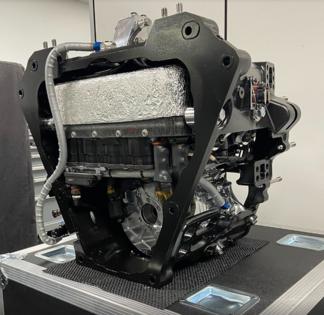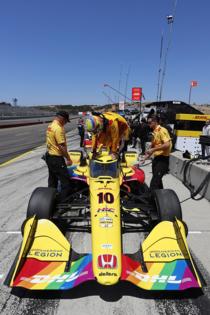Henry Payne: How Honda is going hybrid in racing and production
Published in Business News
NASHVILLE — Win on Sunday, sell on Monday.
Honda’s first hybrid IndyCar won big at the season finale here at the Big Michigan Music City Grand Prix Sept. 15 as Colton Herta took the checkered flag first — and Alex Palou clinched the overall driver's championship. And for customers who want a hybrid Honda of their own for the street, 2025 Civic Hybrids are now on sale across the brand’s North American showrooms, anchoring a hybrid lineup that includes Civic, Accord sedan and CR-V SUV.
Automakers have long used the race track as a marketing tool and engineering test bed for their production programs and the electrification era is no different. Driving towards its “Second Founding” — a battery-powered future by 2040 — Honda is particularly aggressive in integrating its hybrid IndyCar program and street vehicles. But the challenges of racing present to electric drivetrains also expose how far battery-powered cars have to go to compete with their gas-powered brethren.
“The automotive world is flipping on its head at the moment. There are loads of cool things happening in racing in terms of electrification. We have alternate fuels that are 60% carbon neutral; we have hybrid systems; the tire manufacturer is looking at renewable tires . . . there is a lot of stuff that goes into it,” said David Salters, who leads Honda’s North American racing programs as president of Honda Racing Corporation USA. “Honda has all these really smart engine people with a goal. Honda uses racing to develop that.”
As Honda charts a path to an all-electric model lineup by 2040, it has been aggressive in pushing hybrid-powered vehicles as a bridge to that future. That strategy has dovetailed with three of the most prestigious racing series in the world – Formula One, IndyCar, and IMSA sportscar racing — which feature hybrid powertrains.
“Racing is core to our DNA,” said Honda & Acura Motorsports Manager Chuck Schifsky. “Racing is often the perfect test bed for new technology and engineers. It is common for us to integrate our racing learnings and successes into our marketing to show how this helps us develop better mobility products for our customers.”
Honda has partnered with F1’s dominant team, Red Bull, on a hybrid powertrains since 2019 — and will take on a new partner in 2026 when the series moves to an updated 50-50 gas-electric power unit.
On the IndyCar front, Honda is one of two powertrain manufacturers (General Motors Co.'s Chevrolet is the other) and was a driving force in pushing the series to go hybrid this year. The IndyCar system was co-engineered by Honda, Chevrolet, race engine manufacturer Ilmor and IndyCar.
Honda has entered the hybrid hypercar class in IMSA under the banner of its Acura premium brand. GM also races in the hypercar series with its hybrid Cadillac V-Series.R. Unlike Honda, GM has dropped hybrid powertrains in its production vehicles, choosing instead to pursue an all-electric strategy by 2035 (though it is reassessing that model given slow EV sales).
Notably, neither manufacturer supports Formula E, the international, all-electric, open-wheel racing series. “Honda is not looking to enter an all-electric series,” said Schifsky. “We feel that competing in the electrified series of F1, INDYCAR and IMSA help us develop better engineers and mobility products for our customers.”
IndyCar race driver Linus Lundqvist, who races with the Chip Ganassi team, is intrigued by the new hybrid system. “From a drivers point of view, the hybrid has been an amazing development for IndyCar. It’s done two things: One, it keep (drivers) a lot more busy because we’re having to stay on top of the energy management systems, both regeneration and deploy . . . and, two, from the team’s perspective, it’s changed how you fundamentally set up the car. Not only do we deal with more power from the energy system, but it’s also a weight distribution change.”
One of the biggest engineering challenges of electrified drivetrains is managing voltage. The 800-volt hybrid systems (comparable to 800-volt systems used in production EVs like the Porsche Taycan and Hyundai Ioniq 5 N) require extensive driver and racetrack crew safety training given the deadly consequences if a human comes in contact with high voltage.
The IMSA sportscar series — and the tracks it uses like Daytona, Florida, and Circuit of the Americas, Texas — have taken on the challenge. But it’s proven a challenge for other organizations.
“SCCA is very cautious about the risks posed to track personnel because of these electric cars,” said Jack Baruth, a racer with SCCA, the nation’s largest amateur racing organization. “That accounts for a little bit of the caution with bringing EVs to the racetrack.”
For its hybrid package, IndyCar chose a safer, 60-volt supercapacitor system instead of a battery pack. It mitigates concerns on track but also in tight paddocks where IndyCar teams work. As a result, the hybrid units produce just 60 horsepower, according to Salters, much less than F1 or IMSA hybrid systems.
Still, Salters says that IndyCar hybrids have brought huge benefits to Honda engineering.
“Electrification . . . has been really good for the racing side because we get to try and develop new things. One thing that provably isn’t appreciated is that racing companies are like startups,” he said ahead of the Nashville race. “We are very agile, we move very quickly and we talk about sprints in startups where every two weeks you have a goal to achieve — every two weeks, we have a race! So, I know every two weeks whether we have gone forward or not.”
That environment, in turn, attracts engineering talent. “There is a whole new breed of engineers that want to be involved,” he said. “How do you manage energy? How do you deal with current flow? How to help the drivers use it strategically?”
Honda has long dabbled in hybrids, introducing the first hybrid vehicle, the Insight, to the North American market in 1999. But, beginning with the 2024 model year, Honda is producing its core Accord, CR-V and Civic vehicles with hybrid models with plans for those versions to account for up to 50% of sales.
“While our race cars use more advanced electrified hybrid systems than our production passenger vehicles, the root engineering work is similar,” said Schifsky. “Racing electrified hybrid race cars demonstrates to our customers that we race what we sell, and sell what we race.”
The Civic Hybrid is assembled in Greenburg, Indiana, where it will be joined by the Accord Hybrid sedan in 2025. Accord is moving from Marysville, Ohio, which Honda is retooling as its so-called EV Hub — part of a sprawling network of Midwest vehicle and battery manufacturing facilities where the Japanese brand is investing over $4 billion in EVs with a production target of 2026.
The Ohio shakeup comes as consumer EV adoption in the United States is on the wane even as more battery-powered cars hit the market. A 2024 Gallup poll indicated the proportion of prospective buyers of EVs has shrunk from 12% to 9% of the market. But Honda says it is playing a long game.
It plans to sell only EVs by 2040. The consolidation of Honda’s Maryville production to one line is meant to build in flexibility so Honda can make either ICE or EV vehicles depending on consumer taste.
For now, that means hybrid models that are more accepted by consumers — a popularity reflected in the IndyCars that howled around Nashville Speedway with their screaming, V6-powered engines.
“IndyCar uses the hybrid strategically for lap time. It’s been designed for the driver to utilize . . . like the Civic hatchback. You’ll notice the paddles behind the wheel so you can decide how much regen to use,” said Salters, referring to the Civic’s regen paddles, which use the electric motor for one-pedal driving.
He expects racing to be a key element of Honda’s EV “Second Founding” — just as the company’s 20th century founding was grounded in motorcycle and Formula One racing.
“If you think about Honda in Formula One, we are the world champion of hybrids,” smiled Salters, referring to back-to-back Red Bull Honda’s F1 titles in 2022 and 2023.
____
©2024 www.detroitnews.com. Visit at detroitnews.com. Distributed by Tribune Content Agency, LLC.















Comments